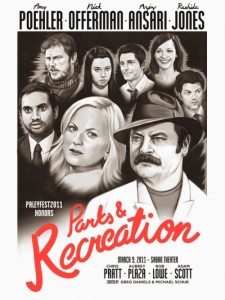Where is television on the US Intellectual History blog? Browsing lightly, I find that we have over the years tackled classic programs like “Roots
,” “Star Trek,” “Doctor Who,” “All in the Family,” and “The Fresh Prince of Bel Air,” and Tim Lacy has explored the intersection of television and the Great Books while Ben Alpers has used the PBS program The Open Mind
to think about the durable legacies of mid-century culture well into the 1970s. But in comparison with our much more robust coverage of film, mu sic, and even sports, we discuss television (especially current television) rather infrequently.
sic, and even sports, we discuss television (especially current television) rather infrequently.
I say that not in criticism but with a genuine question in mind: is there something more difficult about talking about television within an intellectual historical frame? For it seems to me equally true that television seldom pops up in intellectual history monographs or articles, that television programs–apart, I suppose, from significant presidential addresses that have been televised–play a very small part in our histories of intellectual life in the United States after World War II.
But even if that is true (and it may be a faulty impression on my part), there is always some place to start, and I’m asking you in the comments to tell me about any great articles or chapters or even just pages you’ve read about television in intellectual history. That is, I’m not asking to build a bibliography of the history of television (those already exist) but rather one focusing on works of intellectual history in which television plays a role–as subject, illustration, case study, or garnish. Whatcha got?

5 Thoughts on this Post
S-USIH Comment Policy
We ask that those who participate in the discussions generated in the Comments section do so with the same decorum as they would in any other academic setting or context. Since the USIH bloggers write under our real names, we would prefer that our commenters also identify themselves by their real name. As our primary goal is to stimulate and engage in fruitful and productive discussion, ad hominem attacks (personal or professional), unnecessary insults, and/or mean-spiritedness have no place in the USIH Blog’s Comments section. Therefore, we reserve the right to remove any comments that contain any of the above and/or are not intended to further the discussion of the topic of the post. We welcome suggestions for corrections to any of our posts. As the official blog of the Society of US Intellectual History, we hope to foster a diverse community of scholars and readers who engage with one another in discussions of US intellectual history, broadly understood.
I hope these might help. Laurie Ouellette has a piece in the book, Reality TV: Remaking Television Culture, edited by herself and Susan Murray. The chapter is entitled, “Take Responsibility for Yourself: Judge Judy and the Neoliberal Citizen.” Ms. Ouellette has also cowritten a book with James Hay entitled, Better Living through Reality TV: Television and Post-Welfare Citizenship.
I also recommend some of the essays contained within, Breaking Bad: Critical Essays on the Contexts, Politics, Style, and Reception of the Television Series edited by David P. Pierson.
This blog really should examine Breaking Bad someday.
Should a Breaking Bad symposium happen, I would be very happy to participate!
I think that intellectual historians would enjoy Elana Levine’s Wallowing in Sex http://www.amazon.com/Wallowing-Sex-American-Television-Console-ing/dp/0822339196 (full disclosure: EL is my sister-in-law).
I also think (I might be in the minority here) that the TV sections of Cowie’s Stayin Alive are interesting
This is a fascinating topic, and thanks for getting the ball rolling Andy! There are portions of “Equal Time: Television and the Civil Rights Movement” by Aniko Bodroghkozy that I think would qualify, especially the sections that frame how Americans viewed race and race relations through television.
As to why we have not done more, I cannot say for certain–but I will say, from my own personal point of view, that I’d feel more comfortable talking about these topics only after reading a bit more in cultural studies about television in recent history. And, also, there’s the fact that I watch much more older television shows than current programming! I’ve got Deep Space Nine on Netflix going on another tab as I type this, heh.
Thanks to all three of you!
Brian,
The Ouellette material sounds fascinating–thanks! As for Breaking Bad, can you say more about what in particular you think would make that program a good one to be explored on the blog? (Kurt, I’d be really interested in hearing your ideas too, of course!)
Kurt,
The Levine book looks interesting–and a collection that I see he co-edited might also be relevant here: Legitimating Television: Media Convergence and Cultural Status. I don’t know how others feel about the television sections of Cowie’s book, but I felt he did a better job with music (perhaps because Haggard, in particular, is such a fascinating character).
Robert,
You’ve done the most, I think, in talking about television here on the blog–it is I that need to step up my game! In part, that’s what this post is: wondering what keeps me from writing more about television, ubiquitous as it is (and as much interest as I have in it).
Regarding Breaking Bad, I’m sure the writers here could profitably mine the vast text contained within the five seasons of the show. Topics for discussion would include neoliberalism, the depiction of gender roles, construction of ethnic roles, (how many Latinos were NOT members of the cartel?), the rise of the anti-hero, etc. The more adventurous essayists could compare and contrast Breaking Bad with the novel Blood Meridian. Why do we accept that the Southwest can create such aberrant characters?